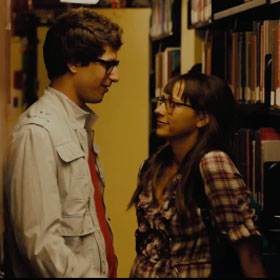'Celeste and Jesse': Not Happily Ever After

4/5
Celeste and Jesse Forever is an intelligent urban romantic comedy that, while several notches above commerical blockbuster quality, also refuses to be so indie that it seems — and looks — too alternative to be real. The film is premised on the age-old When Harry Met Sally question of "can a man and a woman ever be just friends?" — with the added twist that the subjects in question were already married, are in the midst of separating yet continue to act as best friends, and still share an undeniable and undying chemistry, both emotional and sexual.
Unlike such romantic comedies, however, one of this film's most winning elements is its organic unpredictability. There are twists that are as unexpected as they are plausible, and conclusions that are not traditionally happily ever-after, both of which defy the rom-com convention as we know it today. But there's still plenty of magic. Celeste (Rashida Jones), a successful trend forecaster and likeable Type A personality, works shockingly well with smart but chronically passive Jesse (Andy Samberg), a graphic artist that is unemployed and, as we eventually learn, still living in the studio he built behind the couple's formerly shared home. The opening credits deliver a series of heartwarming and goofy snapshot memories of the couple, who met in high school and married young, and the first scenes take pains to demonstrate that the same chemistry endures between them at present, even as — we are ultimately informed well into the film — they are mid-separation. This deliberate delay succeeds in making us wonder what could possibly have driven them apart to begin with, and to ask if those differences are enough to warrant the break-up of a couple that, in many ways, seems to be an ideal match.
The elemental factor behind the wedge, which is never explicitly addressed but rather unfolded gradually, is that Celeste grew up — got a job, bought IKEA furniture, aspired to get a checking account — and Jesse lagged. But the problem is not minimized either: the film does a fair job of showing that, when Jesse eventually moves on to another relationship, he finally does grow up, something that he could not accomplish (or did not deem necessary) by Celeste's side. There is no obnoxious finger-pointing by the film though — merely an exposition of a reality that is rarely so candidly represented in film, and which is significantly more accurate than other dramatic parting of ways.
Written by lead Jones and Will McCormack, who also co-stars as the couple's pot-loving buddy Skillz, this film has its fair share of comedy as well, cleverly intertwined in scenes showcasing Celeste and Jesse's quirky chemistry, their less-than-perfect but highly amusing undoing, and Celeste's eye-opening friendship with one of her clients, Riley (Emma Roberts), who plays a sometimes captious but also endearing teen pop star that pushes Celeste's buttons and spurs on some revelatory self-realizations about her overbearing, judgmental tendencies.
Jones stands her ground as the film's protagonist, and proves — though not entirely effortlessly — that she can bring depth to a character even in a comedy. SNL veteran Samberg, while equally refreshing in his unusually toned-down humor, lets Jones take center stage. The couple's friends Tucker (Eric Christian Olsen) and Beth (Ari Graynor), Celeste's co-worker (Elijah Wood), and Jesse's new girlfriend (Rebecca Dayan), are adequate but forgettable, if only because their characters are very evidently designed to supply transitions or advance the motions. Chris Messina (Julie & Julia and TV's Damages), who plays Celeste's potential next flame, proves better suited to accompany our protagonists and seems to have to try less hard to strike the balance between humor and poignancy as Jesse's charming and feasible replacement.
The indie cred is injected through the cinematography, which is appropriately unbiased for most of the film's duration, but makes a creative statement or two that do not go unnoticed. There are two scenes in particular where director Lee Toland Krieger (The Vicious Kind, December Ends) shows his unique hand, albeit subtly, quietly. The first takes place when Celeste discovers that Jesse is going to be a father shortly after separating, and we are privy to a breathtaking and spectacularly intimate shot of her catching her breath in the bathroom in a dizzying sequence that is equally memorable for its atypical silence (most of the film features a blaring, and excellent, soundtrack). The other standout moment occurs at Tucker and Beth's wedding after-party, which makes aesthetically superb use of Rhode Island's night lights.
Although some scenes show their orchestrated banter, Celeste and Jesse Forever mostly flows nicely, and Jones and Samberg do the thoughtful script justice. Ultimately, Jones and McCormack do an excellent job of delivering an amusing screenplay that features consistent wit and even some stand-out moments of absolute hilarity, without sacrificing the quality of the underlying plot and the dramatic current that grounds it.
RELATED ARTICLES
Get the most-revealing celebrity conversations with the uInterview podcast!







Leave a comment